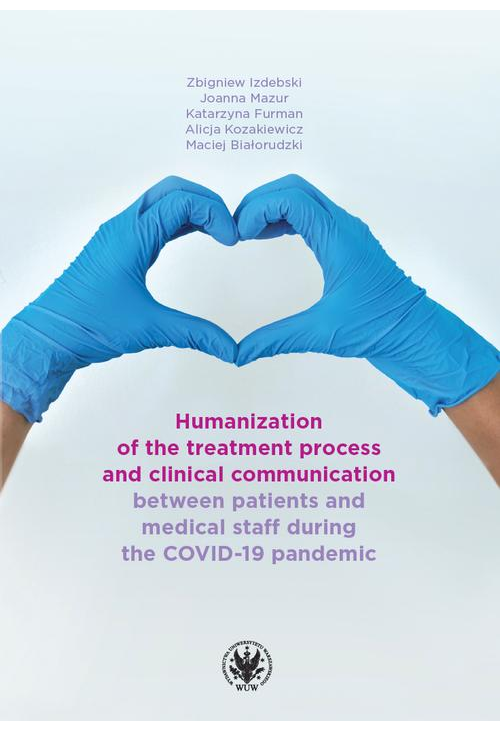
- Za darmo
ebook Humanization of the treatment process and clinical communication between patients and medical staff during the COVID-19 pandemic
Odkryj fascynujący świat humanizacji procesu leczenia i komunikacji klinicznej w czasie pandemii COVID-19 dzięki temu ebookowi - bestsellerowi, który zapewni Ci nie tylko solidną porcję wiedzy, ale także umożliwi głębsze zrozumienie kluczowych aspektów relacji między pacjentami a personelem medycznym.
Ten wyjątkowy ebook autorstwa Zbigniewa Izdebskiego, Joanny Mazur, Katarzyny Furman, Alicji Kozakiewicz i Macieja Białorudzkiego, wydany przez Wydawnictwa Uniwersytetu Warszawskiego w 2023 roku, zabierze Cię w podróż po najnowszych badaniach naukowych przeprowadzonych w Polsce.
Wprawdzie ebooki często kojarzone są z fikcją literacką czy poradnikami, jednak ten tytuł to prawdziwe kompendium wiedzy medycznej i społecznej. Zanurz się w analizie wyników badań dotyczących różnych grup pracowników służby zdrowia oraz pacjentów z całego kraju, którzy podzielili się swoimi doświadczeniami i opiniami na temat pandemii COVID-19.
Zapoznaj się z kluczowymi wnioskami przedstawionymi na I Kongresie Humanizacji Medycyny, a teraz dostępnymi dla szerszej publiczności w formie elektronicznej - idealnej do pobrania i czytania na dowolnym urządzeniu. Ciesz się wygodą wydania cyfrowego, które otwiera nowe horyzonty w zrozumieniu humanizacji medycyny i komunikacji klinicznej w trudnych czasach pandemii.
Nie przegap tej unikalnej okazji do pogłębienia swojej wiedzy na temat jednego z najważniejszych wyzwań współczesnej medycyny. Kup e-booka już dziś i przenieś się w świat, gdzie humanizacja procesu leczenia staje się priorytetem dla pacjentów i personelu medycznego.
Czytaj na dowolnym urządzeniu - laptopie, smartfonie czy tablecie - dzięki wygodnemu formatowi PDF, który jest standardem w świecie publikacji cyfrowych. Sklep z ebookami to Twoje nowe ulubione miejsce na kupowanie i pobieranie ebooków do czytania w dowolnej chwili.
Odkryj najlepsze ebooki w dziedzinie medycyny i nauk społecznych, które zmienią Twoje spojrzenie na proces leczenia i komunikację międzyludzką w czasach kryzysu. Zainwestuj w swoją wiedzę i doświadczenie - wybierz ten ebook jako pierwszy krok do lepszego zrozumienia humanizacji medycyny.
Spis treści ebooka Humanization of the treatment process and clinical communication between patients and medical staff during the COVID-19 pandemic
SUMMARY OF KEY FINDINGS 15PART I: THEORETICAL FOUNDATIONS FOR THE PROJECT 23
1. Research background 23
1.1. Theoretical concepts underpinning the
humanization of medicine 23
1.2. Theoretical models of the doctor–patient
relationship in healthcare 27
2. The medical staff–patient relationship 28
2.1. Transformations of the doctor–patient
relationship 28
2.2. Importance of interpersonal relationships in
healthcare institutions 29
3. Clinical communication 32
3.1. Communication in clinical practice 32
3.2. Importance of communication in clinical
trials 36
4. Patients’ rights 40
5. The COVID-19 pandemic from healthcare workers’
perspective 42
5.1. Mental wellbeing of healthcare workers 44
5.2. Professional burnout 46
5.3. Social relations 48
5.4. Lifestyle elements 51
5.5. Specifics of working in a pandemic 54
6. The COVID-19 pandemic from patients’ perspective
56
6.1. Mental health and physical health 57
6.2. Working life during the pandemic period 60
6.3. Social relations during the pandemic period
61
6.4. Mode of providing medical services 62
6.5. Patients’ avoidance of visits to Healthcare
Facilities 63
7. Protective factors in the COVID-19 pandemic 65
PART II: METHODOLOGICAL ASSUMPTIONS OF THE PROJECT 69
1. Project objective 69
2. Project schedule 70
3. Project methodology and study participants 71
3.1. Pilot study: Qualitative Interviews 72
3.2. Pilot study: Pilot Survey at Healthcare
Facilities 73
3.3. Main study: Survey at Healthcare Facilities
74
3.4. Main study: Patient Population Survey 77
3.5. Main study: Survey of Clinical Trial Patients
78
4. Research tools used in the project 78
5. Method of presenting results 83
PART III: FINDINGS OF THE PROJECT 89
1. Humanization of medicine as perceived by patients
and staff at healthcare facilities 89
1.1. Background of the analysis 89
1.2. Research tools and method of presenting
results 90
1.3. Results 92
1.3.1. The perspective of healthcare workers 92
1.3.2. The perspective of patients of
healthcare facilities 101
1.4. Summary, practical implications, and
directions for further research 114
2. The COVID-19 pandemic from the perspective of
healthcare workers 118
2.1. Background of the analysis 118
2.2. Research tools and method of presenting
results 119
2.3. Results 121
2.3.1. Working during the COVID-19 pandemic 121
2.3.2. Mental health risks 124
2.4. Summary, practical implications, and
directions for further research 126
3. The COVID-19 pandemic, the treatment process, and
the approach to healthcare from patients’ perspective
128
3.1. Background of the analysis 128
3.2. Research tools and method of presenting
results 130
3.3. Results 131
3.3.1. Location, reasons and other
circumstances of treatment 131
3.3.2. Work-related infection risks 133
3.3.3. Impact of the pandemic on the treatment
process and diagnosis 134
3.3.4. Delays in access to medical care 135
3.3.5. Consciously avoiding contact with
healthcare facilities 137
3.3.7. Mental response to the epidemiological
situation 138
3.3.8. Changes in outlook on different spheres
of life 139
3.3.9. Socio-demographic determinants of some
pandemic impact indicators 140
3.4. Summary, practical implications, and
directions for further research 143
4. The health status of healthcare workers and
patients 145
4.1. Background of the analysis 145
4.2. Research tools and method of presenting
results 146
4.2.1. Physical health indicators 146
4.2.2. Mental and social health indicators 147
4.3. Results 150
4.3.1. Physical health 150
4.3.2. Psychosocial health 153
4.3.3. Social support vs. stress levels 159
4.4. Summary, practical implications, and
directions for further research 160
5. Selected health consequences of living in the
COVID-19 pandemic linked to behavioral factors 162
5.1. Background of the analysis 162
5.2. Research tools and method of presenting
results 163
5.3. Results 166
5.3.1. Use of stimulants and selected drugs by
healthcare workers 166
5.3.2. Weight changes according to patients in
a population-based sample 169
5.4. Summary, practical implications, and
directions for further research 171
6. Patients’ rights 174
6.1. Background of the analysis 174
6.2. Research tools and method of presenting
results 177
6.3. Results 178
6.3.1. Knowledge and perception of compliance
with patients’ rights 178
6.3.2. Perceptions of patients’ rights, broken
down by demographic and social characteristics
180
6.3.3. Perception of compliance with patients’
rights vs. level of trust in healthcare
professionals 187
6.4. Summary, practical implications, and
directions for further research 190
7. Public perception of clinical trials (according to
patients in the population-based sample) 192
7.1. Background of the analysis 192
7.2. Research tools and method of presenting
results 193
7.3. Results 194
7.3.1. Willingness to participate in future
clinical trials 194
7.3.2. Factors that may influence the decision
to participate in clinical trials 195
7.3.3. Interest in participating in clinical
trials in the future, broken down by selected
characteristics of respondents 198
7.4. Summary, practical implications, and
directions for further research 204
Table of Tables 207
Index of Figures 211
Bibliography 213
Szczegóły ebooka Humanization of the treatment process and clinical communication between patients and medical staff during the COVID-19 pandemic
- Wydawca:
- Wydawnictwa Uniwersytetu Warszawskiego
- Rok wydania:
- 2023
- Typ publikacji:
- Ebook
- Język:
- polski
- Format:
- epub mobi pdf
- Liczba stron:
- 240
- Miejsce wydania:
- Warszawa
- ISBN dla wersji papierowej:
- 9788323560104
Recenzje ebooka Humanization of the treatment process and clinical communication between patients and medical staff during the COVID-19 pandemic
-
Reviews (0)

Na jakich urządzeniach mogę czytać ebooki?
- Za darmo






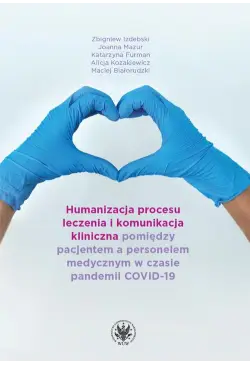




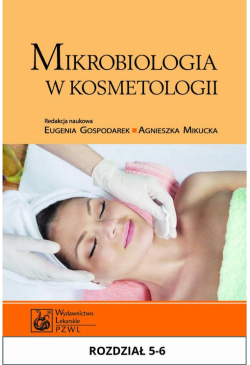


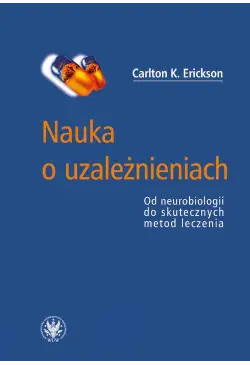
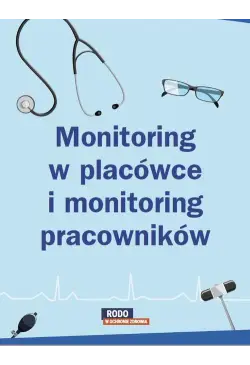
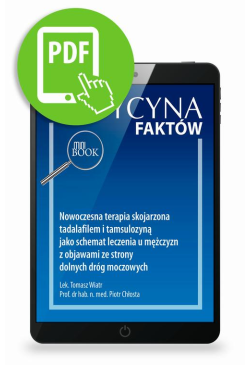
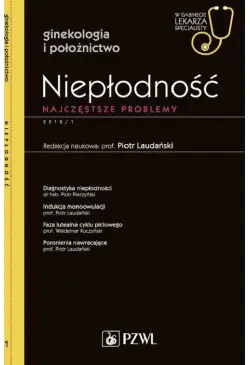


@CUSTOMER_NAME@
@COMMENT_TITLE@
@COMMENT_COMMENT@